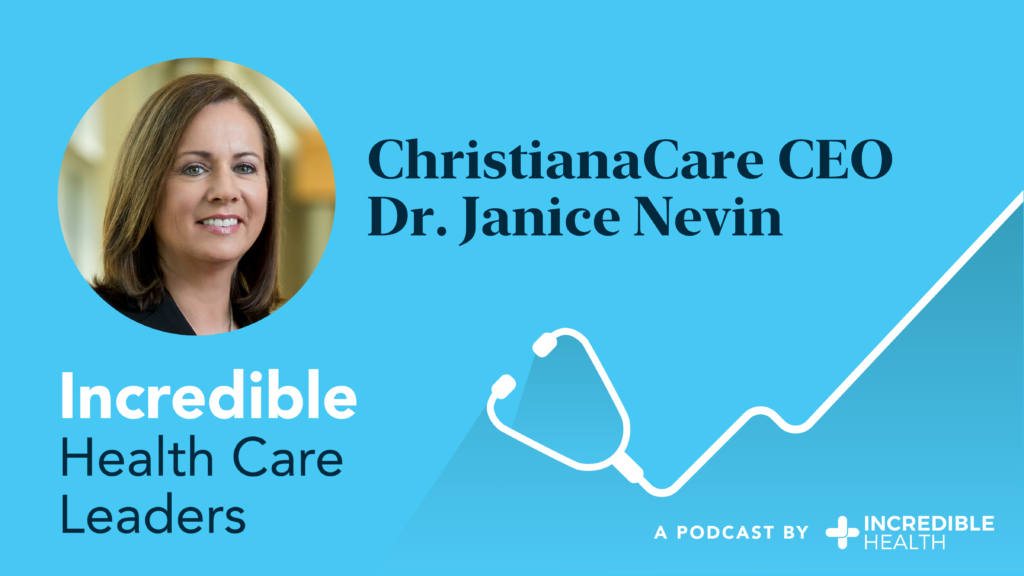Iman Abuzeid, MD, CEO of Incredible Health, interviewed Janice Nevin, MD, MPH, the President and Chief Executive Officer of ChristianaCare, to discuss Dr. Nevin’s journey to becoming CEO, the role of love in healthcare, and her commitment to anti-racism. ChristianaCare is the largest health system in Delaware and is a U.S. News & World Report Best Hospital.
The journey to CEO

As a kid, Dr. Nevin always wanted to be a doctor, but her path to medicine wasn’t always straightforward. She recalls sitting in an undergraduate physics class as a pre-med student, wondering, “what on earth does physics have to do with being a physician?”
Even though she “was one of those kids that always wanted to go to medical school,” as an undergraduate, Dr. Nevin decided to step back from medicine. She became deeply interested in public health, and the relationship between society, policy, and industry, and how, “when we talk about health, we’re talking about much more than the practice of medicine.”
After her undergraduate studies, she went to Durham University in England to learn about social policy, economic policy, and health systems across the world. There, she realized she wanted to be a doctor again.
She felt that as a healthcare provider she could “really start to think about not only delivering health as a practicing clinician, but about making a bigger impact on the entire system.” Dr. Nevin attended medical school at Thomas Jefferson University where she specialized in family medicine, eventually running the residency program.
Dr. Nevin expected to “spend my entire career at Jefferson and eventually become a professor emeritus,” but decided to change course in 2002 when ChristianaCare came knocking, and “life took a different turn.”
She joined to be part of an organization that “deeply understood its mission, was connected to the community, and impacted an entire state.” She joined ChristianaCare 19 years ago, and “six years ago had the incredible privilege of being selected as the CEO.”
She reflects that there are still “some folks from the first part of my career, who I think are wondering why I left academic medicine and took this other path. But I saw the opportunity it presented.”
The value of love in healthcare
Two years into her tenure as CEO, she decided it was time to reexamine ChristanaCare’s organizational values.
But she didn’t want a top-down process. She wanted to engage all 12,000 ChristianaCare employees. She told her leadership team, “I want to be able to talk to anybody in the organization and hear how they contributed. You can imagine the looks I got.”
Her team put out a call for 150 ambassadors to funnel information from the frontline to leadership, and over 400 people volunteered.
When they started, Dr. Nevin expected to end up with a list of four words, but “what emerged was a sentence: we serve together, guided by our values of excellence and love.”
We serve together is an expression of how important teamwork is. Dr. Nevin often says excellence and teamwork are “in our DNA. It’s about being exceptional today and even better tomorrow.”
“I wasn’t surprised that teamwork and excellence emerged, but I’ll be honest, when the word love emerged, I was kind of like, ‘Well, that’s different.’”
In the midst of this process, an orthopedic surgeon came into her office, and asked her to meet one of his patients. The patient was in her mid-sixties, and after her first mammogram had been diagnosed with metastatic cancer.
Dr. Nevin sat with the patient, who shared her experience at ChristianaCare. She told Dr. Nevin, “everywhere I have been in this organization, I have been treated with respect. No one has judged me. I have been treated with kindness. You have made me feel loved.”
And Dr. Nevin realized the power and potential in this patient’s story, “if we can do that for every single person, then we will make a difference.”
Now that ChristianaCare has lived with these values for a few years, the meaning of love in healthcare has deepened for Dr. Nevin. It’s about compassion and caring, but it’s also “speaking the truth with courage and empathy, respecting everyone, and embracing diversity.”
Embodying the value of love “forces you to have challenging conversations that are so important in health care.”
Anti-racism and health equity
In March 2020, Dr. Nevin’s last leadership meeting before the pandemic took hold was focused on racism. Health equity is core to ChristianaCare’s work and “we have been committed to being an anti-racist organization” for a long time, “although I’m not sure that we would have been able to articulate that in that way 18 months ago.”
Dr. Nevin recalls kneeling for 8 minutes and 46 seconds in remembrance of George Floyd’s murder, in partnership with White Coats for Black Lives. Which “was incredibly moving. We did it across the organization, and it helped us focus on the work that we need to do.”
That work included less visible structural changes, like empowering employees to have courageous conversations about racism, funding employee resource groups like those to help grow black leaders, and reviewing HR policies to ensure they are anti-racist.
In particular, ChristianaCare has completely revamped succession planning and leadership development. “We don’t have enough leaders with brown and black skin. We need to do more. And we need to be intentional about that.”
The commitment to antiracism is not only impacting internal policies, but also changing how ChristianaCare works with marginalized communities. Dr. Nevin’s team partners with local leaders to provide the healthcare interventions their communities need, and ensures the delivery mechanism is tailored to the needs of that community.
For example, ChristianaCare established a presence at the Latin American Community Center early in the pandemic, initially to offer COVID tests. But because they brought materials in Spanish, interpreters, and Spanish-speaking healthcare providers, it became a larger conversation about health, and “it was really about creating trust.”
Because ChristianaCare invested in building trust, when it was time to roll out the vaccines, they were invited into typically hard to access communities to ensure people were able to get vaccinated. According to Dr. Nevin, “the relationships have been invaluable, and we have done vaccine event after vaccine event.”
At one particular mass vaccination event for Delaware’s LatinX community, more than 400 people were vaccinated. Like most mass vaccination events, at the end of the day there were a few doses leftover that would go to waste if unused.
So the team went to the Walmart around the corner.
They found an additional 20 people who needed to be immunized, also from the LatinX community, and there weren’t any unused doses at the end of the day. According to Dr. Nevin, “that’s the kind of commitment that we’ve made and it’s brought us all such joy to be able to deliver the vaccine, to be part of these events.”
Caring for caregivers
According to Dr. Nevin, ChristianaCare’s ongoing investment in caregiver wellness enabled a stronger pandemic response. In 2016, ChristianaCare established the Center for WorkLife Wellbeing, which not only provides support for those experiencing burnout and stress, but also focuses on “bringing joy and meaning to work, and connecting people to their purpose.”
The established caregiver wellness program allowed ChristianaCare to quickly expand services for providers when the pandemic hit. For Dr. Nevin, there was no question “we were going to do whatever was needed to care for our caregivers.”
Expanded pandemic services included prepaid childcare, prepaid hotel rooms, and the ability to use PTO, something most health systems limited. In addition, experts from the Center for WorkLife Wellbeing walked the halls 24 hours a day, throughout all three shifts, with a cart carrying snacks, masks and glass defoggers.
According to Dr. Nevin, it wasn’t really about the cart, “it was about the conversations that happened around the cart.” It was a place where stressed caregivers could talk about their anxiety, their fears, and their needs. Those conversations were valuable in themselves, but they also allowed Dr. Nevin and her leadership team to further tailor support programs based on caregivers’ evolving needs.
For ChristianaCare, “when we look at our strategic aims, caregiver experience is right up there. If we don’t create the right kind of experience for our caregivers, they won’t be able to create the right kind of experience for patients.”
Exceeding expectations
While Dr. Nevin has been exceptionally successful in her career, she’s had her share of setbacks as well. When asked about her greatest professional failure, she shared that the hardest work has been “around people and around partnerships.”
As a leader, what she’s learned is “you’re not always going to make the right decision, but you have to make decisions.” Sometimes, that can mean changing course, especially if a decision has unintended consequences. “It’s how you manage the impact of that decision that really determines success or failure.”
Her greatest professional regrets are not acting sooner when she knew someone on her team was not in the right role. “When I look back, I’ve spent too many nights lying awake and haven’t moved quickly enough.”
Ultimately, as a leader, Dr. Nevin says, “I want to help people exceed their own expectations.” Which for her, “really goes back to serving together with excellence and love, and having authentic conversations if we’re going to make a difference.”
